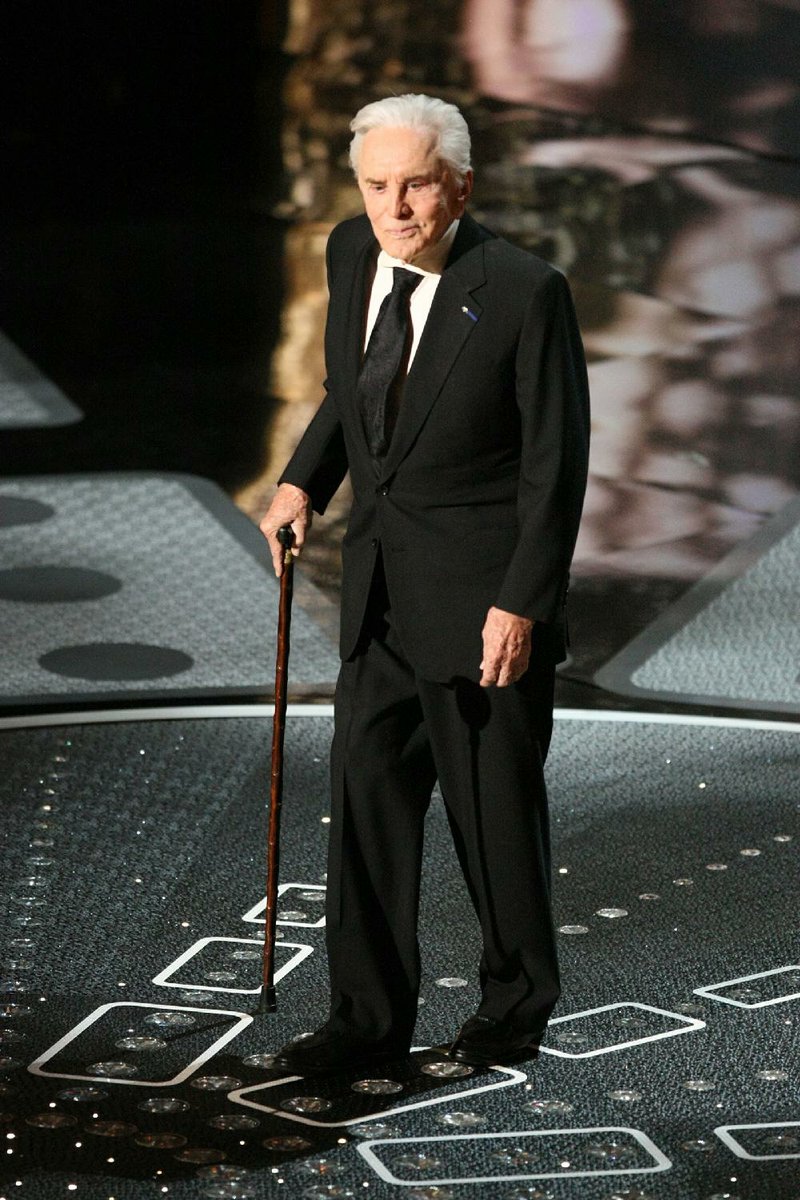Kirk Douglas, who starred in Spartacus, Lust for Life and dozens of other films, helped fatally weaken the blacklist against suspected communists, and reigned for decades as a Hollywood maverick and patriarch, died Wednesday, his family said. He was 103.
"It is with tremendous sadness that my brothers and I announce that Kirk Douglas left us today at the age of 103," his son Michael said in a statement on his Instagram account. "To the world, he was a legend, an actor from the golden age of movies who lived well into his golden years, a humanitarian whose commitment to justice and the causes he believed in set a standard for all of us to aspire to."
Kirk Douglas, the son of illiterate Russian immigrants, was one of the top movie stars of the 20th century. He appeared in more than 80 films, in roles ranging from Doc Holliday in Gunfight at the O.K. Corral to Vincent van Gogh in Lust for Life.
He worked with some of Hollywood's greatest directors, from Vincente Minnelli and Billy Wilder to Stanley Kubrick and Elia Kazan.
Douglas never received an Academy Award for an individual film, despite being nominated three times -- for Champion, The Bad and the Beautiful and Lust for Life.
But in 1996, the Academy of Motion Picture Arts and Sciences awarded him an honorary Oscar. His other awards included a Presidential Medal of Freedom and a lifetime achievement award from the American Film Institute.
In his latter years, he was a final link to movies' "golden age," a man nearly as old as the film industry itself.
In his youth, he represented a new kind of performer, more independent and adventurous than Clark Gable, Spencer Tracy and other giants of the studio era of the 1930s and 1940s, and more willing to speak his mind.
Reaching stardom after World War II, he was as likely to play cads (the movie producer in Bad and the Beautiful, the journalist in Ace in the Hole) as he was suited to play heroes. He started his own production company in 1955, when many actors still depended on the studios, and directed some of his later films.
Douglas was especially proud of his role in the downfall of Hollywood's blacklist, which halted and ruined the careers of writers suspected of pro-communist activity or sympathies. By the end of the 1950s, the use of banned writers was widely known within the industry, but not to the public.
Douglas, who years earlier had reluctantly signed a U.S. loyalty oath in order to get the starring role in Lust for Life, provided a crucial blow to the campaign against communists when he openly credited the former communist and Oscar winner Dalton Trumbo for script work on Spartacus. That epic about a slave rebellion during ancient Rome was released in 1960.
Of his films, Douglas' personal favorite was the 1962 Western Lonely are the Brave, which included a line of dialogue from a Trumbo script that Douglas called the most personal he ever spoke on screen: "I'm a loner clear down deep to my very guts."
The most famous words in a Douglas movie were spoken about him, not by him.
In Spartacus, Roman officials tell a gathering of slaves that their lives will be spared if they identify their leader, Spartacus. As Douglas rises to surrender, slaves one after another stand up and shout, "I'm Spartacus!"
Douglas stands silently, a tear rolling down his face.
As Michael Douglas once observed, few acts were so hard to follow. Kirk Douglas was an acrobat, a juggler, a self-taught man who learned French in his 30s and German in his 40s.
Life was just so many walls to crash through. A stroke in his 70s threatened to end Kirk Douglas' career, but he continued to act and write for years and was past 100 when he and his wife published Kirk and Anne: Letters of Love, Laughter, and a Lifetime in Hollywood.
He was born Issur Danielovitch to an impoverished Jewish family in Amsterdam, N.Y. His name evolved over time. He called himself Isidore Demsky until he graduated from St. Lawrence University in New York.
He took the name Kirk Douglas as he worked his way through the American Academy of Dramatic Arts, choosing "Douglas" because he wanted his last name still to begin with "D" and "Kirk" because he liked the hard, jagged sound of the "K."
In the 1970s and 1980s, he did several notable television films, including Victory at Entebbe and Amos, which dealt with abuse of the elderly.
In his 70s, he became an author, his books including the memoir The Ragman's Son, the novels Dance With the Devil and The Gift, and a brief work on the making of Spartacus.
Douglas also became one of Hollywood's leading philanthropists. The Douglas Foundation, which he and Anne Douglas co-founded, has donated millions to institutions, ranging from the Children's Hospital Los Angeles to the Motion Picture & Television Fund.
Information for this article was contributed by Bob Thomas of The Associated Press.
A Section on 02/06/2020

